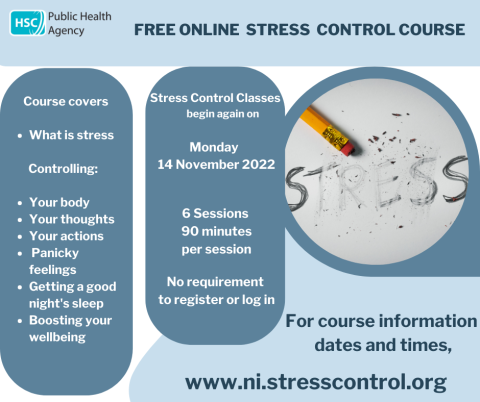Watching out for the signs of stress and ways to deal with it.

Wednesday 2 November is Stress Awareness Day and the Public Health Agency (PHA) is highlighting the signs and symptoms of stress and what we can do to tackle stress in our lives, including free online stress control classes.
Stress is the feeling of being unable to cope as a result of too much mental or emotional pressure. It can affect our physical health as well as our mental health and wellbeing. Common signs of stress can include sleeping problems, sweating, loss of appetite and difficulty concentrating. You may feel anxious, irritable, experience racing thoughts, worry constantly or go over things in your head.
Shauna Houston, Health Improvement Manager at the PHA said: “We are all experiencing challenging times, particularly with the cost of living crisis, which brings anxiety and stress. These external factors can put pressure on our home life, work and our relationships with friends and families.
“Stress causes a surge of hormones in our bodies. These stress hormones are released to enable us to deal with pressures or threats – the so-called 'fight or flight' response. People have different ways of reacting to stress. We may lose our temper more easily, drink more alcohol or act unreasonably. People sometimes experience headaches, muscle tension or pain, or dizziness and fatigue. Sometimes when stress is severe or prolonged, it can lead to burnout, with extreme emotional and physical exhaustion.”
One of the most effective methods to help deal with stress and wellbeing recommended for people of all ages and lifestyles is to ‘Take 5 Steps to Wellbeing’ – connect, be active, take notice, keep learning and give.
‘Take 5’ encourages people to take simple actions and make deliberate choices to help look after themselves to build resilience around their mental and emotional wellbeing. There are many examples of how to adapt the 5 Steps to our everyday lives. The following are examples how to Take 5 to help tackle stress:
Connect – meet with friends and family and take the time during Stress Awareness Day to talk about how you are feeling and listen to others. Aim be more aware of friends and family and how they are feeling – are they showing signs they are stressed?
Give – people tend to cope with stress differently, so sharing personal experiences of coping might also help you and someone else deal with stress better.
Be active – exercising helps to minimise the impact of stress on the body and mind. It helps to improve sleep, balance hormones, increase endorphins and fosters relaxation. Even if it’s a gentle walk in the park, a cycle, gardening or even housework, it can count as physical activity.
Keep learning – explore self-help toolkits and learn new skills to help you cope better with stress, or take part in the upcoming free online stress control classes available on www.ni.stresscontrol.org
Take notice – stop, pause and take a moment to be still and look around you, focus on your breathing. Also consider reducing your time watching the news and browsing social media if it is having a negative impact. Try to become aware of what triggers tend to cause stress and anxiety and think about reducing these stress triggers. Look at the ways that stress begins and then aim to resolve those with coping strategies.
Free online stress control classes begin on 14 November for six weeks. Each session lasts 90 minutes, the sessions cover:
- What is stress?
- Controlling your body.
- Controlling your thoughts.
- Controlling your actions.
- Controlling panicky feelings/getting a good night’s sleep.
- Boosting your wellbeing and controlling your future.
One of the advantages of the free online stress control classes, is that you can take part from the comfort of your own home, offering privacy and confidentiality,
There are no requirements to register on login.
To find out visit www.ni.stresscontrol.org
For resources and self-help tools, including Take 5 Steps to Wellbeing and the Steps to Deal with Stress booklet, which provides tips and practical advice on coping with stress, recognising stress, learning from bad experiences and how to take action, visit www.mindingyourhead.info
If you or someone you know is experiencing issues with alcohol and/ or drug misuse, information on support services in your local area can be found at www.DrugsAndAlcoholNI.info
